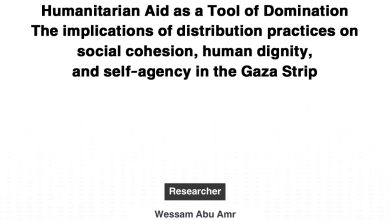Israel and Fatah are pushing Gazans over the edge, with no help from Egypt in sight

 It was a moment that Mohamed Youssef, 44, had never experienced throughout his career of 20 years. Youssef is in charge of the emergency section in the health department of Rafah city, the furthest point south in the Gaza Strip. The unprecedented moment came when his cell phone rang at dawn 15 February. He learned that people had been killed and others left injured and bleeding in the area near the Gaza international airport east of Rafah after the occupation army raided the area and opened fire randomly.
It was a moment that Mohamed Youssef, 44, had never experienced throughout his career of 20 years. Youssef is in charge of the emergency section in the health department of Rafah city, the furthest point south in the Gaza Strip. The unprecedented moment came when his cell phone rang at dawn 15 February. He learned that people had been killed and others left injured and bleeding in the area near the Gaza international airport east of Rafah after the occupation army raided the area and opened fire randomly.
Youssef was placed in an extremely difficult situation, as for the first time he and his staff were unable to reach the area with ambulances because there was simply not enough fuel to run them. After an extremely short moment of hesitation, Youssef and his staff headed out on motorcycles offered by people to help the first aid team perform their duties, even if in a humble manner. When they arrived and began to perform first aid, they found that two of the injured had died and that of the 10 others three were in critical condition. Youssef ordered that the dead and those with light injuries be transported on donkey carts belonging to residents in the area, while those in critical condition be transported to the nearest hospital in private gas-fuelled vehicles belonging to area residents.
Maawiya Hassanein, director of the emergency department in the Palestinian Ministry of Health, told Al-Ahram Weekly that “90 per cent of the Health Ministry’s 57 ambulances are out of order because of the severe lack of fuel and diesel.” Hassanein warns that this situation threatens the lives of thousands of the sick since these vehicles play an essential role in saving their lives. He points out that from now on it won’t be possible for ambulances to transfer those wounded in Israeli attacks in Gaza due to the lack of fuel. “The life of thousands of cardiac and kidney patients and women giving birth are in danger because the ambulances have stopped running,” he said, calling the situation “a catastrophe”. “The critical lack of medicine and the malfunctioning of medical equipment is enough without adding this to the list of major problems the health sector in Gaza suffers from,” he said in a bitter tone.
Due to the lack of fuel, Gaza City’s half a million citizens are on the verge of a health disaster. The fuel necessary to run sewage treatment plants is not available, meaning that sewage water will flood some neighbourhoods, says municipality General Director Imad Siam. “If the fuel needed to run these plants is not made available, many residents will die of diseases spread as a result of this deplorable situation,” he told the Weekly.
Israel has stopped supplying the Gaza Strip with fuel and only provides an extremely limited amount of unleaded gas that meets a mere 10 per cent of the Strip’s needs. It has stopped supplying diesel gas altogether, and ambulances run on diesel. The stores of diesel that Palestinians purchased while the border between the Gaza Strip and Egypt was open have been exhausted. The cars driving on Gaza’s roads are either taxis running on unleaded gas, which Israel allows to enter in small quantities, or on gas meant for cooking.
Anyone who visits Gaza’s markets these days will quickly notice that most of the goods bought by Palestinians while the border with Egypt was open have run out. One clear sign that such goods have run out is the increased business of workshops specialising in repairing old, worn-out shoes. With no new shoes available, in most cases the Palestinians whose shoes have worn out must go to such shops to repair them.
Omar Shaaban, a prominent economist, holds that the present situation is proof that opening the border with Egypt was a solution to the critical economic situation in Gaza. The solution, he says, lies in opening the borders officially and publicly, so that commercial trade functions between Gaza and Egypt via the Rafah crossing, though this cannot replace economic ties between Gaza and Israel. “The Palestinians are not currently able to run their national economy without a connection to the Israeli economy,” he told the Weekly.
Yet all indicators suggest that there is no solution on the horizon, at least not in the near future. The Hamas delegation led by Mahmoud Al-Zahar that recently met with Egyptian security officials in Arish did not succeed in reaching an agreement on organising commercial trade between the Gaza Strip and Egypt. Despite the optimistic statements of Hamas leaders following the meeting, trusted sources told the Weekly that the meeting did not result in progress on any issue, for the Egyptian officials insisted on tying any change in the situation on the border to domestic Palestinian agreement on the crossing issue. That will not happen any time soon because of the gaping chasm between the position of Hamas and Palestinian President Mahmoud Abbas.
As if these problems were not enough for the suffering Gazans, the Ramallah government itself, led by Salam Fayyad, has made the lives of tens of thousands of Palestinian civil servants unbearable by refusing to pay their salaries. The justification for this has been that they were either appointed on the eve of Hamas winning the legislative elections or at some point afterwards. Alaa Al-Batta, head of the Civil Servants Syndicate in the territories of the Palestinian Authority, says that Fayyad’s government has so far stopped paying the salaries of 40,000 civil servants, 20,000 of whom are soldiers that Ahmed Qurei’s government ordered to be absorbed into the PA security agencies in 2005. They continued to work during the first term of Prime Minister Ismail Haniyeh, and so the Fayyad government decided not to pay their salaries, even though most of them are affiliated with Fatah.
“We turned to a number of lawyers in Ramallah to file cases with the Supreme Court against the Fayyad government, but we were surprised when the lawyers who had agreed in the beginning went back on their word after they received threats from the Fayyad government’s security agencies,” he told the Weekly. Al-Batta asserts that the Fayyad government’s actions against the Palestinians in the Gaza Strip are more “criminal” than even those of the occupation government.
The Fayyad government defended its measures, saying that any civil servant who had taken action that could be “understood as being against Palestinian legitimacy” had been dismissed. Ibrahim Abrash, the culture minister in Fayyad’s government said that “the dismissal of civil servants was not limited to those affiliated with Hamas, but rather every person who engaged in any activity against Palestinian legitimacy or who did not acknowledge the legitimacy of President Abu Mazen was dismissed.” He added that those affected could appeal to the judiciary if they felt that they had been done wrong. With regard to the relation between the security agencies and the cutting of civil servants’ salaries, he clarified, “there is no relation in the true sense of the word, but in every country security agencies monitor the extent of civil servants’ affiliation to the legitimate regime, and if it is felt that some of the civil servants are undertaking activities that undermine the regime and threaten security, reports are filed on them.”
Salah Al-Bardweil, spokesperson for the Hamas parliamentary bloc in the Palestinian Legislative Council, holds that the Fayyad government’s action are part of a comprehensive plan led by Israel, the United States, and some regional parties to shake up the situation in the Gaza Strip, precipitating the collapse of the “legitimate government”. “They are dreaming,” he told the Weekly. “The Palestinian political regime in its current formulation is the outcome of popular will and no military action or economic pressure can change that. On the contrary, the reaction shows the people rallying around Hamas and its government.”
More than a million and half Palestinians living in the Gaza Strip are suffering with no end in sight and only expect this reality to grow worse. What is certain is that this suffering has brought results unintended by the parties placing military and economic pressure on the Palestinians. The Palestinian Centre for Survey and Policy Research led by Khalil Shikaki recently announced the outcomes of a poll showing that support for Hamas has increased among Palestinians, and that most have come to place more trust in the dismissed prime minister Ismail Haniyeh than in President Abu Mazen.




